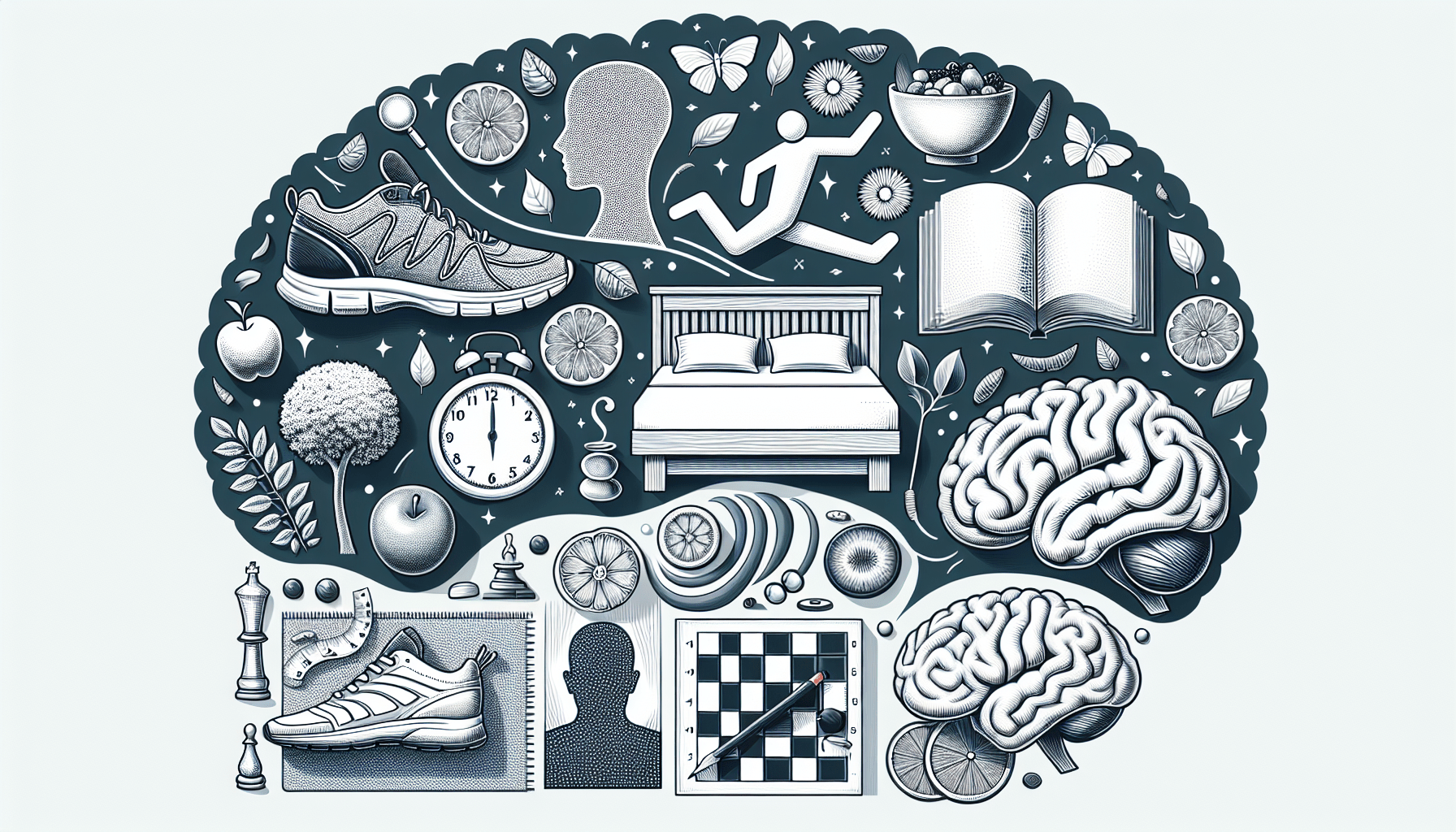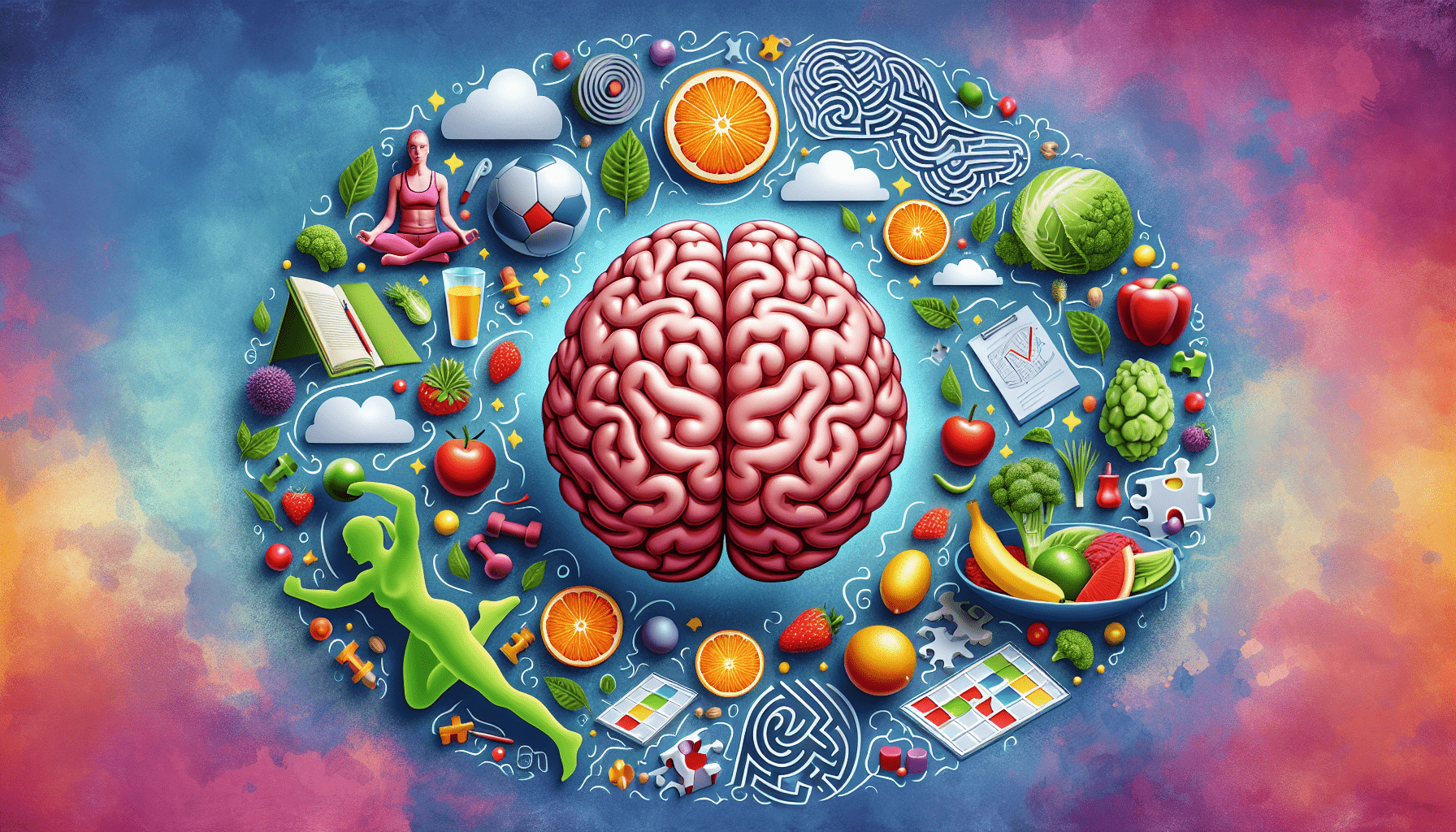You're probably already aware of the importance of maintaining a healthy brain and the impact it can have on your overall well-being. But have you ever wondered if there are natural ways to support brain health and delay cognitive decline? In this article, we'll explore some intriguing methods that can potentially help you do just that. From incorporating certain foods into your diet to engaging in regular physical exercise, there are numerous ways to give your brain a boost and potentially reduce the risk of cognitive decline. So, grab a cup of tea and get ready to discover the natural secrets to a healthier brain.

Nutritious Diet
Importance of Balanced Diet
Maintaining a balanced diet is crucial for overall health, including brain health. Your brain depends on a constant supply of nutrients to function optimally. A balanced diet ensures that your brain receives all the necessary nutrients it needs to support its functions, such as memory, concentration, and problem-solving abilities. Incorporating a variety of foods, including fruits, vegetables, whole grains, lean proteins, and healthy fats, will provide your brain with the essential vitamins, minerals, and antioxidants it requires.
Brain-Boosting Foods
Certain foods have been shown to have a positive impact on brain health. Including them in your diet can help boost cognitive function and delay cognitive decline. Foods rich in omega-3 fatty acids, such as fatty fish, walnuts, and flaxseeds, are beneficial for brain health. These fatty acids have been associated with improved memory and cognitive abilities. Additionally, consuming blueberries, dark chocolate, turmeric, and green tea provides antioxidants that protect the brain from oxidative stress and inflammation.
Detrimental Foods for Brain Health
Just as some foods can improve brain health, there are also foods that can have a detrimental effect on cognitive function. Foods high in saturated fats, such as fried and processed foods, can contribute to inflammation in the brain, impairing its normal functioning. Excessive sugar consumption has also been linked to cognitive decline and negatively impacts memory and learning. Limiting the intake of these foods is important to maintain optimal brain health.
Physical Activity
Effects of Regular Exercise on Brain Health
Engaging in regular physical activity has numerous benefits for brain health. Exercise increases blood flow to the brain, delivering oxygen and essential nutrients. It also stimulates the release of growth factors that promote the growth and connection of nerve cells, thereby improving cognitive function. Studies have shown that individuals who exercise regularly have better cognition, memory, and attention span compared to those who lead a sedentary lifestyle.
Exercise Intensity and Cognitive Function
The intensity of exercise plays a crucial role in its effect on brain health. Moderate-intensity aerobic exercises, such as brisk walking, swimming, or cycling, have been found to be most beneficial for cognitive function. These exercises increase heart rate and oxygen flow to the brain, promoting neuroplasticity and improving cognitive performance. High-intensity interval training (HIIT) has also shown promising results in boosting brain health.
Best Exercises for Brain Health
While any form of physical activity is beneficial, certain exercises are particularly effective in promoting brain health. Besides aerobic exercises, activities that challenge coordination, balance, and motor skills, such as dancing, yoga, or tai chi, have been associated with improved cognitive function. These activities engage multiple areas of the brain simultaneously, stimulating neural connections and enhancing brain plasticity.
Mental Stimulation
Role of Mental Exercises in Enhancing Cognition
Just as physical exercise is essential for the body, mental exercise is crucial for maintaining cognitive function. Engaging in mentally stimulating activities can improve memory, attention, and overall cognitive performance. Activities such as reading, puzzles, and learning new skills challenge the brain and promote the growth and connection of neurons. Keeping your mind active and constantly learning helps maintain brain health and delays cognitive decline.
Popular Brain Games
Brain games and puzzles have gained popularity in recent years due to their potential benefits for brain health. Games like Sudoku, crossword puzzles, and chess require strategic thinking and problem-solving skills, which help stimulate different regions of the brain. Online platforms and mobile applications also offer a wide variety of brain training games specifically designed to improve cognitive function and memory.
Lifelong Learning and Mental Health
Continuing to learn new things throughout your life has been linked to better cognitive function and a reduced risk of cognitive decline. Taking up new hobbies, attending classes or workshops, reading books, or even learning a new language can help keep your brain active and stimulated. Lifelong learning not only enhances cognitive abilities but also promotes mental well-being by providing a sense of accomplishment and intellectual fulfillment.
Quality Sleep
Impacts of Sleep Deprivation on Brain
Adequate sleep is crucial for maintaining optimal brain health. Sleep deprivation can have serious consequences on cognitive function and overall brain health. When you don't get enough sleep, the brain's ability to consolidate memories, process information, and make decisions is compromised. Lack of sleep has also been associated with an increased risk of conditions such as Alzheimer's disease, depression, and anxiety.
Healthy Sleep Habits
To promote quality sleep and support brain health, it is important to establish healthy sleep habits. Aim for 7-9 hours of uninterrupted sleep each night. Maintain a regular sleep schedule, even on weekends, to synchronize your body's internal clock. Create a relaxing bedtime routine, such as reading or taking a warm bath, to signal your body that it is time to sleep. Ensure your sleep environment is conducive to rest, with a cool, dark, and quiet atmosphere.
Sleep Disorders and Cognitive Dysfunction
Sleep disorders, such as insomnia or sleep apnea, can significantly impact cognitive function. If you suspect you have a sleep disorder, it is important to consult a healthcare professional for diagnosis and treatment. These disorders can disrupt the quality and quantity of sleep, leading to problems with memory, attention, and problem-solving abilities. Treating sleep disorders can help improve cognitive function and support brain health.

Social Engagement
Interpersonal Relationships and Cognitive Health
Maintaining strong interpersonal relationships is not only important for emotional well-being but also for brain health. Social interactions provide mental stimulation and emotional support, both of which are vital for cognitive function. Engaging in meaningful relationships, whether with family, friends, or community groups, can help prevent cognitive decline and improve overall brain health.
Role of Social Activities in Brain Stimulation
Participating in social activities can provide cognitive stimulation and promote brain health. Engaging in conversations, playing team sports, or joining clubs and organizations that align with your interests can all contribute to mental well-being. Social activities often involve problem-solving, critical thinking, and communication skills, which exercise different cognitive functions and enhance brain plasticity.
Impact of Loneliness on Cognitive Decline
Loneliness and social isolation have been linked to an increased risk of cognitive decline and dementia. When you lack social interaction, your brain may not receive the necessary stimulation it needs to maintain optimal function. Loneliness can also contribute to a higher level of stress, leading to negative impacts on cognitive abilities. Prioritizing social engagement and nurturing relationships is crucial for preserving brain health.
Stress Management
Chronic Stress and Brain Function
Experiencing chronic stress can have detrimental effects on brain function. Prolonged exposure to stress hormones, such as cortisol, can impair memory, attention, and decision-making. Chronic stress also increases the risk of developing mental health disorders, such as anxiety and depression, which further impact cognitive function. Managing and reducing stress is vital for maintaining a healthy brain.
Beneficial Stress-Relieving Activities
Incorporating stress-relieving activities into your daily routine can help protect your brain from the negative effects of chronic stress. Engaging in activities such as yoga, meditation, deep breathing exercises, or mindfulness practices can promote relaxation and reduce stress levels. Regular physical exercise, spending time in nature, and pursuing hobbies or creative outlets are also effective ways to manage stress and support brain health.
Link between Mindfulness and Cognitive Preservation
Practicing mindfulness, which involves paying attention to the present moment without judgment, has been found to have numerous cognitive benefits. Mindfulness meditation helps reduce stress, improve attention and focus, and enhance emotional regulation. Regular mindfulness practice has also been associated with increased gray matter in regions of the brain associated with memory and cognitive function.
Moderate Alcohol Consumption
Effects of Excessive Alcohol on Cognitive Health
While moderate alcohol consumption has been associated with certain health benefits, excessive alcohol consumption can have detrimental effects on brain health. Chronic heavy drinking can lead to alcohol-related brain damage, causing memory loss, impaired cognitive abilities, and an increased risk of developing dementia and other cognitive disorders. It is important to consume alcohol in moderation to protect brain health.
Neuroprotective Benefits of Moderate Drinking
Moderate alcohol consumption, defined as up to one drink per day for women and up to two drinks per day for men, has been associated with some neuroprotective benefits. Research suggests that moderate alcohol intake may reduce the risk of developing cognitive decline and dementia, particularly in older adults. However, it is important to note that these potential benefits may vary based on individual factors and should be balanced with the risks associated with alcohol consumption.
Understanding Risk Factors
Individuals with certain risk factors, such as a family history of alcohol abuse, personal history of alcohol-related problems, or medical conditions that may be exacerbated by alcohol, should exercise caution when considering alcohol consumption. It is important to consult with a healthcare provider to determine whether moderate alcohol consumption is appropriate for you and to understand the potential risks and benefits based on your specific circumstances.
Avoidance of Tobacco and Drug Use
Impact of Smoking on Brain Health
Smoking tobacco has numerous harmful effects on overall health, including brain health. Nicotine, the addictive component of tobacco, constricts blood vessels, reducing oxygen supply to the brain. Regular smoking has been associated with an increased risk of cognitive decline, memory problems, and an elevated risk of developing dementia. Quitting smoking is crucial for preserving brain health and improving overall well-being.
Consequences of Drug Misuse on Cognition
The misuse of drugs, including illicit substances and certain prescription medications, can have severe consequences on brain health and cognitive function. Drug misuse can lead to neurochemical imbalances, impaired memory and attention, and an increased risk of developing mental health disorders. Seeking professional help and support is essential for individuals struggling with drug addiction to protect brain health and regain cognitive functioning.
Tips for Ceasing Smoking and Drug Consumption
Quitting smoking or overcoming drug addiction can be challenging, but it is essential for preserving brain health. Seeking support from healthcare professionals, joining smoking cessation or addiction support programs, and building a strong support system can increase your chances of success. Identifying and addressing underlying triggers or stressors that contribute to smoking or drug use is also important for long-term recovery and brain health.

Regular Health Check-Ups
Need for Regular Cognitive Assessment
Regular cognitive assessments are essential for monitoring brain health and detecting any signs of cognitive decline or impairment. These assessments can help identify potential risks or early signs of conditions such as dementia or Alzheimer's disease. Early detection allows for early intervention and appropriate management strategies to support cognitive function and overall brain health.
Common Cognitive Health Tests
Common cognitive health tests include assessments of memory, attention, problem-solving, and language skills. These tests help evaluate cognitive abilities and compare them to age-related norms. Examples of cognitive tests include the Mini-Mental State Examination (MMSE), Montreal Cognitive Assessment (MoCA), and the Clock Drawing Test. These tests are typically administered by healthcare professionals, such as neurologists or geriatricians.
Role of Healthcare Providers in Cognitive Health Maintenance
Healthcare providers play a crucial role in maintaining cognitive health. Regular visits to healthcare professionals allow for preventive measures, early detection of cognitive decline, and appropriate management strategies. They can provide guidance on lifestyle interventions, offer support for behavior modifications, and prescribe medications or therapies when necessary. Establishing a strong partnership with your healthcare provider is vital for proactive brain health management.
Natural Supplements
Use of Omega-3 Fatty Acids
Omega-3 fatty acids, particularly docosahexaenoic acid (DHA) and eicosapentaenoic acid (EPA), are essential for brain health. These fatty acids play a vital role in the structure and function of brain cells, promoting efficient communication between neurons. Adding omega-3 fatty acid-rich foods, such as fatty fish (salmon, mackerel), chia seeds, and flaxseeds, to your diet can support brain health. Alternatively, omega-3 fatty acid supplements can be considered, but it is important to consult with a healthcare provider for proper dosage and guidelines.
Vitamin B Complex and Brain Health
B vitamins, specifically vitamins B6, B9 (folate), and B12, are crucial for brain health and cognitive function. These vitamins are involved in the production of neurotransmitters that regulate mood, memory, and cognitive processes. Adequate intake of B vitamins through a balanced diet, including foods like leafy greens, legumes, eggs, and fortified cereals, supports optimal brain health. However, supplementation may be necessary for individuals with specific deficiencies or dietary restrictions, and it is advisable to consult a healthcare professional before taking any supplements.
Curcumin and Cognitive Function
Curcumin, a compound found in turmeric, has gained attention for its potential cognitive benefits. Curcumin has anti-inflammatory and antioxidant properties, which can protect the brain from oxidative stress and neuroinflammation. Studies suggest that curcumin may enhance memory and attention in individuals with cognitive impairment. However, more research is needed to determine the optimal dosage and long-term effects of curcumin supplementation on brain health. It is advisable to consult with a healthcare provider before adding curcumin supplements to your routine.
Incorporating these natural ways to support brain health and delay cognitive decline into your lifestyle can have a significant impact on your overall well-being. Remember, maintaining a balanced diet, engaging in regular physical activity, stimulating your mind, prioritizing quality sleep, nurturing social connections, managing stress, avoiding tobacco and drug use, scheduling regular check-ups, and considering natural supplements can all contribute to promoting a healthy brain and a sharper mind as you age. Take charge of your brain health and embrace these habits to enjoy a vibrant and fulfilling life.



